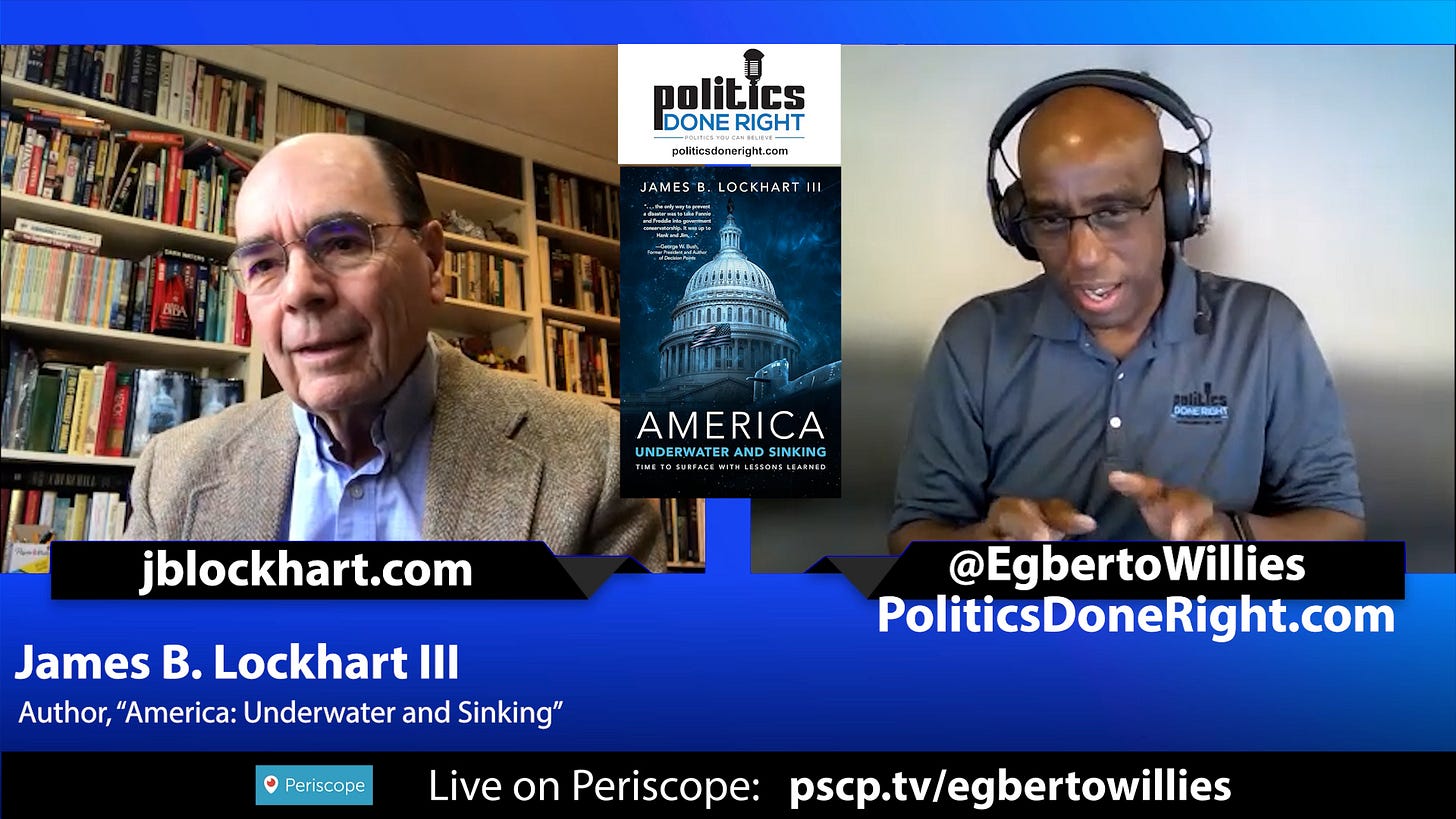James B. Lockhart III, Bush’s Social Security Administration COO, on America Under Water & Sinking
Fmr. Bush’s Social Security Admin COO James B. Lockhart III visited PDR to discuss the state of many of our social programs, specifically Social Security. His book's America: Under Water & Sinking.
In a recent edition of “Politics and Right,” an insightful and critical discussion unfolded with James B. Lockhart III, the former Principal Deputy Commissioner and COO of the Social Security Administration under President George W. Bush. Lockhart, author of the award-winning book “America Under Water and Sinking,” and currently a Senior Fellow at the Bipartisan Policy Center, delved into the current state of Social Security, looming potential cuts, and the broader implications these changes hold for American society.
Lockhart’s book, as he explained, is a metaphorical depiction of his career in government, where he observed firsthand the ‘underwater’ status of several major government agencies. His narrative, stretching from his early days on a nuclear ballistic submarine to his tenure overseeing the Pension Benefit Guaranty Corporation under President H.W. Bush and later the Social Security Administration under President George W. Bush, paints a vivid picture of the systemic challenges faced by these institutions.
A significant focus of the discussion was on the Bush administration’s attempt to reform Social Security, a move Lockhart describes as touching the “third rail of politics.” As history shows, this attempt was met with substantial resistance, indicating the deeply entrenched political and societal complexities surrounding Social Security. Lockhart’s observation that the effort failed despite exempting those over 55 from changes highlights the powerful influence of organizations like AARP and the deep-seated fears and misconceptions surrounding any talk of Social Security reform.
Lockhart’s perspective on Social Security’s challenges is twofold: demographic shifts, primarily due to the baby boomer generation’s retirement, and a lack of political will to address these impending issues. He suggests that while the demographic challenges are significant, the greater hurdle is the political impasse. This impasse stems from a reluctance to confront uncomfortable truths about the sustainability of Social Security and the need for reform to ensure its longevity.
The conversation also touched on the economic disparities the current Social Security system exacerbated. Lockhart emphasizes that while the average couple might not face severe consequences, the lower-income groups are most vulnerable. These groups often rely on Social Security for a significant portion of their retirement income.
Lockhart also brought up the broader context of his experiences, particularly during the 2008 financial crisis when he oversaw Fannie Mae and Freddie Mac. His insights into the housing market’s collapse and subsequent government interventions shed light on the interconnectedness of various economic sectors and the government’s role in stabilizing them.
The interview concluded with a discussion on the value of public service, with Willies commending Lockhart for his government work. This acknowledgment serves as a reminder that public service, often overshadowed by the private sector, plays a crucial role in shaping and maintaining the welfare of society.
James B Lockhart III, America Under Water and Sinking
While Willies clarified that all income should be taxed for Social Security to ensure fairness, Lockhart was not keen on that tenet. While Lockhart was a competent bureaucrat, he continued to suffer from the false ideological indoctrination that the private sector was inherently more efficient than the public sector. However, he eventually conceded that the private sector had serious problems. Here is a statement of fact: generally, where the public sector fails, it is a private sector-induced failure.
Help us inform to the public to win 2024
The economy, while still difficult for many, has improved a lot. Many policies have not yet been realized because we need a president, a House, and a Senate to pass them. We are on the path to making big changes. But well-funded Right-Wing media, from writers to bloggers to vloggers, are being paid to mislead us. Our platforms, from this newsletter to our blogs, videos, and podcasts, are intent on doing their part to reverse and improve the polls. Please subscribe, less than the price of a coffee, to be a part of this work by clicking the subscribe button below. Check our work/platforms here.







This kind of obsolete thinking really bugs me. Social Security, unlike most corporations, has always had enough funds to meet its obligations, even though it doesn't have access to things like bank loans that corporations freely make use of to get them through lean quarters. The entire SS funding issue could be permanently solved quite easily, by simply printing the money to cover any looming shortfalls, either by congress authorizing the fed to do it or by "minting the coin." This would NOT be inflationary because we wouldn't be increasing the money people have to spend. Retirees would simply keep getting what they're already getting. The second-best solution is to simply cover any shortfall out of the general fund like we do with virtually everything else, which would mean more debt, but in an MMT world that shouldn't be a huge issue. The last thing we need is some old-school thinker like this guy trying to fix things with austerity. We've seen how that works.